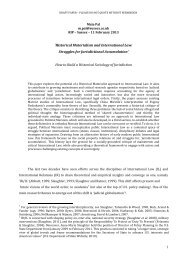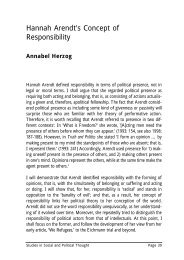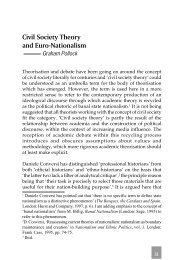Just a Matter of Choice? Student Mobility as - University of Sussex
Just a Matter of Choice? Student Mobility as - University of Sussex
Just a Matter of Choice? Student Mobility as - University of Sussex
You also want an ePaper? Increase the reach of your titles
YUMPU automatically turns print PDFs into web optimized ePapers that Google loves.
Abstract<br />
A recurring question with regard to international student mobility/migration is why students go<br />
abroad. Most <strong>of</strong>ten, this question is answered by pointing out different factors, e.g. the<br />
students‟ expressed re<strong>as</strong>ons for going abroad, specific psychological traits, or differences in<br />
economic and social capital. This paper, however, looks at the question from a processual<br />
perspective, <strong>as</strong>king how students become geographically mobile, thus perceiving studying<br />
abroad not <strong>as</strong> the result <strong>of</strong> (a one-time) choice, but <strong>as</strong> the outcome <strong>of</strong> different social and longterm<br />
biographical processes and events. The analysis is b<strong>as</strong>ed on narrative-biographical<br />
interviews with German degree-mobile students who went abroad to another European country.<br />
By reconstructing the different contexts and trajectories from which their mobility originated,<br />
the role <strong>of</strong> previous mobility experiences, but also <strong>of</strong> critical events which influenced the paths<br />
<strong>of</strong> these students, is highlighted.<br />
Introduction<br />
Academic interest in international student<br />
mobility h<strong>as</strong> certainly grown over recent<br />
years, since this phenomenon is part and<br />
parcel <strong>of</strong> several, <strong>of</strong>ten politically induced,<br />
developments affecting higher education<br />
and societies more generally. Within the<br />
European Union (EU), for example, student<br />
mobility plays a substantial role in the socalled<br />
Bologna Process, the creation <strong>of</strong> a<br />
„European Higher Education Area‟<br />
(Papatsiba 2006; Mechtenberg and Strausz<br />
2008). It is also discussed more generally<br />
<strong>as</strong> an important dimension <strong>of</strong> the<br />
internationalisation and marketisation <strong>of</strong><br />
higher education (Teichler 2004) and with<br />
regard to highly skilled migration (Koser<br />
and Salt 1997; Diehl and Dixon 2005).<br />
While most <strong>of</strong> this research deals with the<br />
wider implications <strong>of</strong> the students‟<br />
geographical mobility, this paper goes back<br />
to the preceding concerns <strong>of</strong> migration<br />
research by taking up the recurring<br />
question <strong>of</strong> why students move to another<br />
country.<br />
Surveying the existing literature, it appears<br />
that answers to this question are<br />
predominantly b<strong>as</strong>ed on models pointing<br />
out various factors at different levels which<br />
are seen <strong>as</strong> furthering or impeding mobility,<br />
the so-called push-/pull-factors or drivers<br />
<strong>of</strong>/barriers to mobility (e.g. Gordon and<br />
Jallade 1996; Mazzarol and Soutar 2002;<br />
Szelényi 2006; Li and Bray 2007; Maringe<br />
and Carter 2007; Doyle et al. 2010). An<br />
elaborate version <strong>of</strong> such a model, which<br />
lists factors on the international, national,<br />
institutional and individual level, is<br />
exemplarily set out in HEFCE (2004: 42),<br />
and some studies progress this approach to<br />
the psychological level (Frieze et al. 2004,<br />
2006). 1 Insufficient foreign language<br />
pr<strong>of</strong>iciency, financial constraints or fears to<br />
leave one‟s family and friends, for instance,<br />
are regarded <strong>as</strong> barriers to student mobility,<br />
while the motivation to improve one‟s<br />
language competences and career<br />
prospects or limited access to tertiary<br />
education in one‟s own country (due to<br />
„numerus clausus‟ regulations or the nonavailability<br />
<strong>of</strong> specific courses) can be<br />
considered <strong>as</strong> driving forces. Furthermore,<br />
research on student mobility h<strong>as</strong> repeatedly<br />
shown that the likelihood <strong>of</strong> going abroad is<br />
influenced by the students‟ socio-economic<br />
background, previous experiences <strong>of</strong><br />
geographical mobility, and family members<br />
or friends who are abroad or who have lived<br />
abroad in the p<strong>as</strong>t. Thus, mobile students<br />
tend to have a higher social-cl<strong>as</strong>s<br />
background than their non-mobile peers,<br />
<strong>of</strong>ten dispose <strong>of</strong> experiences <strong>of</strong> being<br />
abroad prior to their educational mobility<br />
and cite family members or friends <strong>as</strong><br />
having had a positive influence on their<br />
decision to go abroad (West et al. 2000;<br />
Jahr and Teichler 2002; King et al. 2010;<br />
on German students cf. Müßig-Trapp and<br />
1 A noteworthy exception to these mechanistic push-pull<br />
models are those studies which argue, in the wake <strong>of</strong><br />
Bourdieu, that studying abroad functions <strong>as</strong> an important<br />
mechanism in the process <strong>of</strong> social reproduction <strong>of</strong><br />
advantage (Marceau 1989; Brooks and Waters 2009;<br />
Waters and Brooks 2010).<br />
2

















